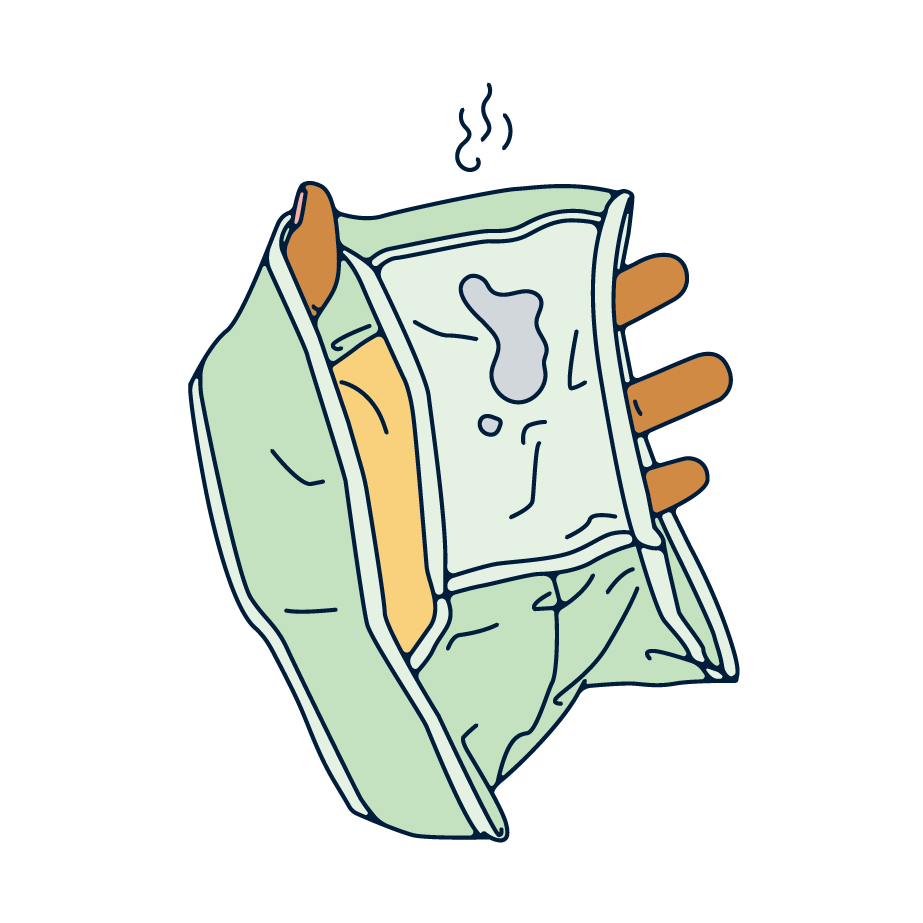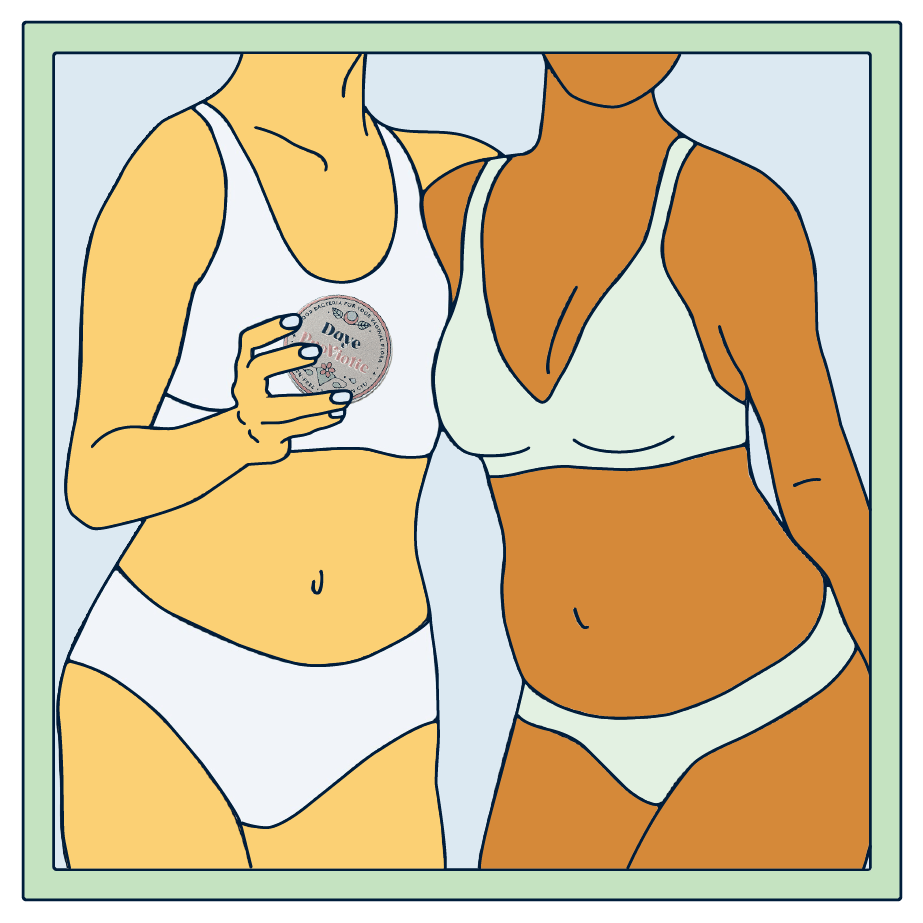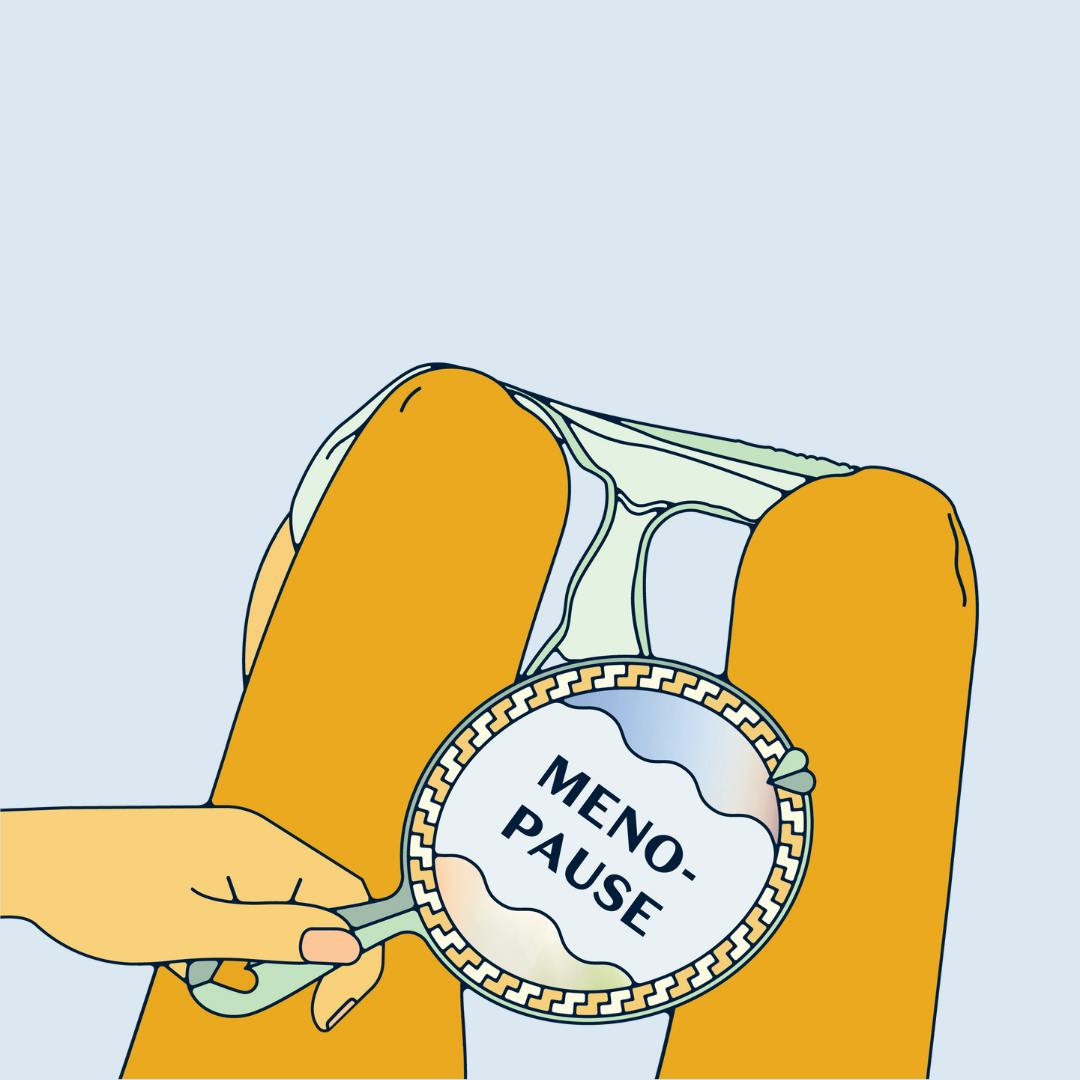Table of contents
1. What is menopause?
2. What is perimenopause?
3. What are the symptoms of menopause?
4. Why am I experiencing vaginal dryness during menopause?
5. Why am I getting increased vaginal infections during menopause?
6. How can I ease vaginal menopause symptoms?
7. How can ProViotics support vaginal health during menopause?
Illustrated by Sabrina Bezerra, Erin Rommel & Valko Slavov
I’m 29. Consequently, I’ve never really given much thought to what will happen to my body during menopause. I’m still very much in my era of painful periods and tentative conversations with friends on a Friday night about whether we should freeze our eggs.
But sometimes, when I hear older family members worrying about getting on the tube due to feeling unbearably hot, I wonder what my signs of menopause will be like. Will I lie awake every night, mind racing? Will I be overcome with waves of heat that seem to shake my body from the inside out? I’m a Pilates teacher, and pelvic floor exercises have started to take on a new significance with every passing year.
One thing I virtually never think about, though, is how my vagina will be affected by this bodily change; and this is because I’ve barely ever seen or heard vaginal health in menopausal women being discussed. This lack of transparency is regrettable, to say the least, because menopause can affect the vagina in a vast number of ways – all of which can, in turn, impact physical and mental wellbeing.
What is menopause?
“Menopause is a natural part of the aging process when a woman’s ovaries stop producing eggs or ovaries have been removed,” says Dr Geeta Kumar, consultant gynaecologist and Vice President of the Royal College of Obstetricians and Gynaecologists. “During the menopause, hormone levels change and periods stop. Menopause is defined when a woman hasn’t had a period for 12 months.”
Kumar explains that the average age for someone to reach menopause in the UK is 51, with menopause generally occurring between 45 and 55 years of age. “Whilst 51 is the average age, some women can experience menopause much earlier. If it occurs before the age of 40, it is known as premature menopause,” Kumar continues, adding: “The menopause will affect every woman at some point in their lives. There is no ‘one size fits all’.”
What is perimenopause?
Effectively, it’s like a ‘pre-menopause’. “[It’s] the time before your periods stop when your levels of oestrogen begin to fall,” says Kumar. “This can last from a few months to four or five years – occasionally longer. Not all women have symptoms at this stage, but some women may experience similar symptoms to the menopause.”
Speaking of which…

What are the symptoms of menopause?
Dr. Betsey Greenleaf DO, FACOOG (Distinguished), FACOG (among other credentials) is President of The Pelvic Floor Store; a spokesperson for pHD Feminine Health; and host of the upcoming Happy Vagina Rally, a women’s wellness virtual summit taking place from 18-23 May 2023. She explains that, during menopause, “levels of the hormones oestrogen and progesterone decline”; and this hormonal shift leads to the following symptoms:
- Hot flushes, which Greenleaf describes as “sudden feelings of warmth, sweating and flushing of the skin”; together with night sweats, which are hot flushes taking place while asleep;
- Mood swings: “Irritability, depression and anxiety can occur due to the fluctuation of hormones”;
- Brain fog: “Because of the neurotransmitter properties of oestrogen and progesterone, women can experience increased forgetfulness or difficulty expressing themselves”.
Other menopause symptoms listed by Greenleaf include:
- Sleep disturbances;
- Joint and muscle aches;
- Decreased libido;
- Fatigue.
And then, of course, there’s vaginal dryness, which Greenleaf describes as: “Decreased lubrication of the vagina, which can cause discomfort during intercourse.”
Perimenopause symptoms are largely similar to those of the menopause, with the added element of disruption to periods. “Women are still getting their period during [perimenopause],” Greenleaf explains. “The period often becomes irregular and unpredictable” – and subsequent perimenopause symptoms indicated by Greenleaf include:
- “Longer or shorter time between bleeding”;
- “Longer or shorter length of the [period]”;
- “Heavier or lighter bleeding”;
- “Or just a period that is all over the place, meaning one month they have it; and then the next month they don’t.”
But back to vaginal dryness…
Why am I experiencing vaginal dryness during menopause?
In short, the ‘vaginal dryness’ menopause symptom is part of a condition known as vulvovaginal atrophy, or VVA.
VVA is part of genitourinary syndrome of menopause (GMS). Everyday Health explains that GMS refers to “a drop in oestrogen levels and physical changes to the vagina, vulva and vagina opening, which can cause symptoms like dryness”; and that GMS affects over half of postmenopausal women.
Kumar confirms this. “Low levels of oestrogen due to the menopause can cause changes in the vagina and urinary bladder,” she says. “The skin of the vulva and the lining of the vagina tend to become thinner, drier and less elastic. This is [...] vulvovaginal atrophy.”
“The vaginal tissue slows down its growth and begins to thin out,” explains Greenleaf, going on to add that further vaginal changes as a result of VVA include itching and burning; and that further vaginal changes as a result of menopause include the following:
- Pain during sex. “Due to a retraction of the blood vessels in the vagina, the vagina produces less natural lubrication, making intercourse more uncomfortable or even painful”;
- Loss of vaginal elasticity. “The vagina can become less flexible, which can make sexual activity less enjoyable and increase the risk of tearing or injury”;
- Urinary symptoms. “The decrease in oestrogen can also affect the bladder and urethra, leading to symptoms such as urinary incontinence, urgency and frequency”;
- Changes in the appearance of the vulva. “The labia minora can shrink and sometimes go away. The skin of the vulva may become drier [and] thinner, which can make it more prone to itching and irritation.”

Why am I getting increased vaginal infections during menopause?
Another valid – and important – question. Pre-menopause, vaginal pH is naturally around 3.8 to 5.0, which is fairly acidic. Enter menopause, though, and that all changes.
“With falling levels of oestrogen, the vaginal pH increases, making the vagina less acidic and more prone to vaginal infections,” explains Kumar.
Effectively, it’s all about the decrease in lactobacilli that occurs as a result of menopause. [The vagina] stays acidic when we are younger due to the balance of healthy bacteria in the lactobacillus family,” says Greenleaf. “This bacteria and acidity helps to protect against infections by creating an environment that is hostile to harmful bacteria and yeast.”
When the oestrogen starts decreasing, though, the whole system – or healthy vaginal microbiome – starts to break down. “The lactobacillus starves to death [without oestrogen], thus [increasing] the vaginal pH, making the vagina more alkaline,” Greenleaf continues. She explains that this process can increase the risk of infections such as:
- Bacterial vaginosis;
- Yeast infections;
- Urinary tract infections;
- Parasites;
- Sexually transmitted diseases.
In short, if you’re experiencing painful pee or a change of smell in the vagina during menopause: you’re not alone.
How can I ease vaginal menopause symptoms?
For starters: exercise caution when using feminine hygiene products. As Bonafide pointed out: “Many of these products do more harm than good”.
“An increase in vaginal pH from unbalanced soaps, washes or lubricants, along with stress and medications, can also lead to a decrease in lactobacillus,” says Greenleaf. “This can lead to an overgrowth of harmful bacteria, which can cause irritation, discharge and other symptoms.”
Greenleaf emphasizes that it’s vital to speak with your healthcare practitioner as a first port of call, adding that treatment options may include:
- “Over-the-counter vaginal creams and suppositories”;
- “Prescription medications such as antibiotics and antifungals”;
- “In some cases, hormone therapy or regenerative therapy may also be recommended to help restore the balance of hormones in the body and improve vaginal health.”
Kumar adds to this by agreeing that “vaginal menopausal symptoms can be improved with use of vaginal low-dose oestrogen and/or non-hormonal products, such [as] vaginal moisturisers”.

How can ProViotics support vaginal health during menopause?
We’re glad you asked. While evidence is still limited, there’s an increasing suggestion that probiotics can play a vital role in vaginal health, helping with BV and yeast infections – and Daye’s ProViotics contain 100% live lactobacilli. We already know this is the ‘good bacteria’ we need in order for the vaginal microbiome to thrive and to protect against infections – and it’s been confirmed via lab tests that Daye’s ProViotics survive in both the gut and the vagina.
Simon Gaisford FRSC CChem SRPharmS is Professor of Pharmaceutics at UCL School of Pharmacy. He’s previously said: “Daye’s ProViotic was developed specifically to increase the ratio of good bacteria in the vaginal canal, strengthening the overall health of the vaginal microbiome”.
But, as with anything, a well-rounded approach to vaginal health is always best.
“Yes, probiotics and eating fermented foods such as kimchi, sauerkraut [and] yoghurt is one of the keys to supporting a healthy vagina but probiotics alone in menopause won’t do the trick,” says Greenleaf. “It is a complex interplay between having the right pH, the presence of healthy bacteria, and having a food source to support the healthy bacteria.” In order for that food source to be provided, Greenleaf explains the vagina needs to be thickened – which could occur via, e.g., “topical hormones placed in the vagina” or “vaginal rejuvenation as performed by a healthcare provider”.
Ultimately, if you’re experiencing vaginal dryness, discomfort or increased vaginal infections during menopause it’s important to speak with your doctor. Everyone’s body is different; and never more so than during menopause.






